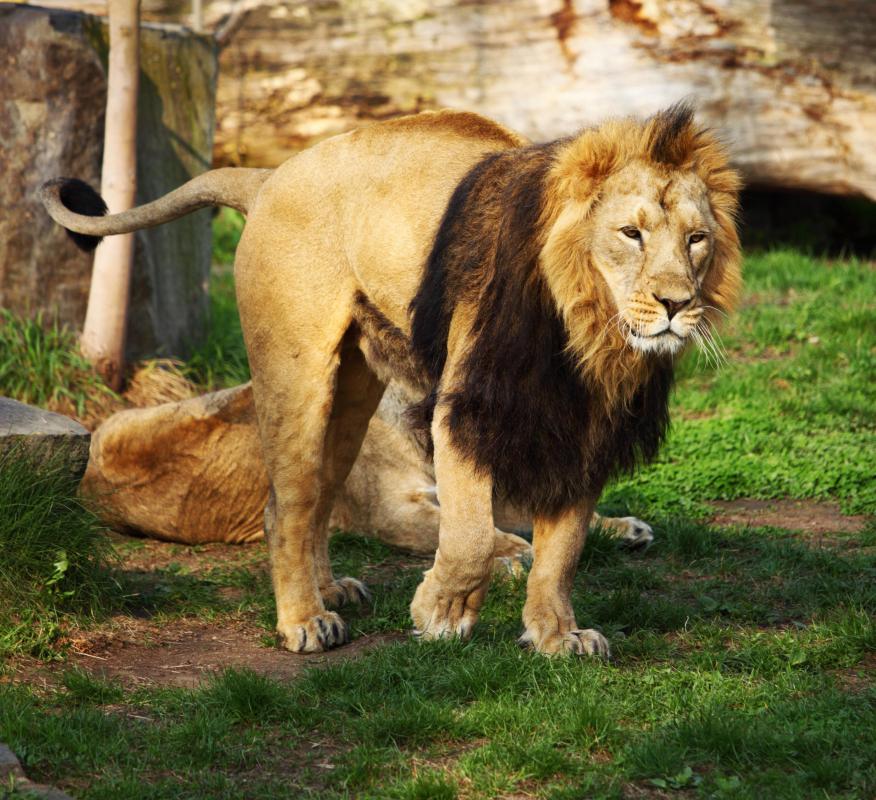At AllThingsNature, we're committed to delivering accurate, trustworthy information. Our expert-authored content is rigorously fact-checked and sourced from credible authorities. Discover how we uphold the highest standards in providing you with reliable knowledge.
What Is Lion Conservation?
Lion conservation aims to preserve the few lions remaining in their natural habitats. This is largely achieved through cutting down on hunting and keeping their natural habitats safe. The number of lions living in the wild has decreased dramatically due to a variety of factors. Some estimate that, as of 2011, the lion population has dropped below 30,000.
There are two types of lions alive today, the African and the Asian lion. African lions are now limited to the sub Saharan region of the continent, but they used to span the entire continent. Asian lions are much more rare, and only found in one forest in India, where they are protected. Asian lions can grow to heavier weights than African lions.

One way lion conservation works is by educating the local people about the importance of lions, which can decrease killings for food or sport. Some funds even improve villages by providing schools, better access to food, and health care. Some lions are part of national parks or nature reserves, where they can be better protected.
Lions are frequently poisoned by farmers after they kill livestock. A lion will typically kill an animal and then come back later to eat it, after the farmer has had an opportunity to sprinkle some poison on the body. Carrion birds also may die in this manner. Lion conservation projects are trying to get the sale of such pesticides banned.

Also important for lion conservation is the study of their ecology. Scientists track the movement of lions as well as their diet and behavior. Special collars are put onto some lions to help track them. Tracking can help researchers learn the areas that each group of lions frequents, and how many lions each pride has at any given time. This can also help farmers and herders learn how to better protect their livestock form predators, to cut down on retaliatory killings.

Any time a collared lion dies, the researchers can track it own to find out the cause of death. Knowing what most often kills the lions can help lion conservation workers prevent similar deaths in the future. Also, some lions are more likely to kill livestock. If these individuals can be identified, measures can be taken to prevent more livestock predation.
Another aspect of lion conservation includes compensating the local people. If they get money for living peacefully with the lions they will be less likely to kill them.The local people can also go to school to learn to be guides for tourists and to learn conservation techniques for all local animals.
Frequently Asked Questions
Why is lion conservation important?
Lion conservation is crucial because lions play a vital role as apex predators in maintaining the balance of ecosystems. They help regulate prey populations, which in turn influences vegetation and habitat structure. According to the IUCN Red List, lions are classified as vulnerable, with their populations decreasing due to habitat loss, human-wildlife conflict, and poaching, making conservation efforts essential for their survival.
What are the main threats to lion populations?
The main threats to lion populations include habitat loss due to expanding human settlements and agriculture, conflicts with humans (often due to livestock predation), poaching for their body parts, and reduced prey availability. The African Lion & Environmental Research Trust reports that these factors have contributed to a significant decline in lion numbers over the past century.
How many lions are left in the wild?
As of the latest estimates, there are approximately 20,000 to 25,000 lions left in the wild. This represents a dramatic decrease from the early 20th century when the lion population was believed to be around 200,000. Conservation efforts are imperative to prevent further declines and ensure the long-term survival of this iconic species.
What are some successful lion conservation strategies?
Successful lion conservation strategies include establishing and expanding protected areas, implementing community-based conservation programs that incentivize local people to protect lions, and developing wildlife corridors to connect fragmented habitats. Anti-poaching initiatives and efforts to reduce human-lion conflict, such as building better livestock enclosures, are also key components of effective conservation.
How can individuals contribute to lion conservation?
Individuals can contribute to lion conservation by supporting reputable wildlife conservation organizations, advocating for policies that protect lions and their habitats, and promoting awareness about the challenges lions face. Responsible tourism that benefits local communities and conservation projects can also make a significant impact, as can reducing one's carbon footprint to combat climate change.
What role do zoos play in lion conservation?
Zoos play a multifaceted role in lion conservation through captive breeding programs, which can help maintain genetic diversity and potentially reintroduce lions into the wild. They also serve as educational platforms to raise public awareness about lion conservation issues and often contribute funding and expertise to in-situ conservation projects around the world.
AS FEATURED ON:
AS FEATURED ON:













Discuss this Article
Post your comments